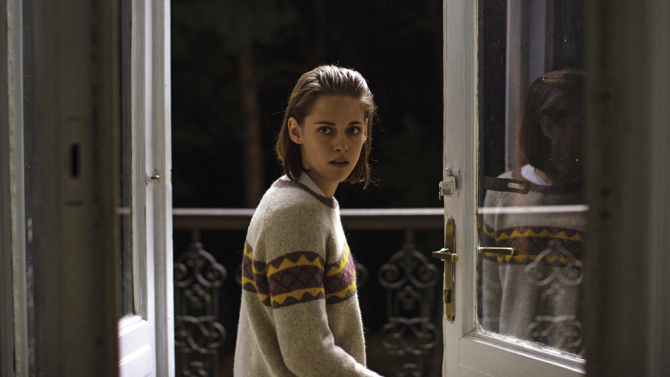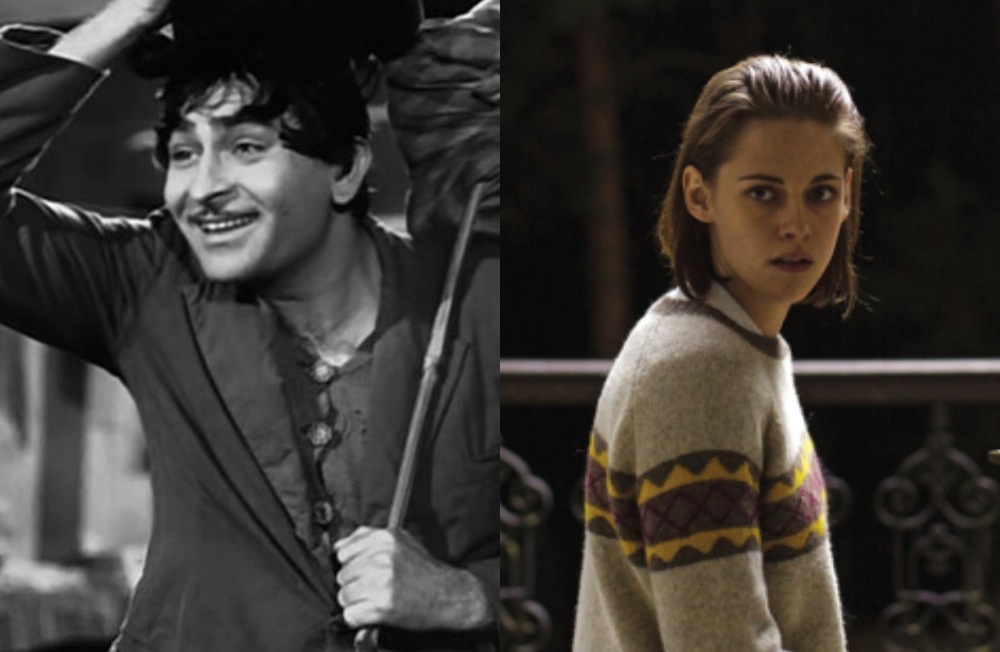The lobby of the Galaxy Casino’s multiplex is the only place you can escape the omnipresent sight and sound of Christmas music and decorations. Granted, they never stop playing (on loop) “Pure Imagination” from “Willy Wonka and the Chocolate Factory” and the theme from “E.T.” Still, movie music is a nice respite from lounge versions of vomitous Christmas carols.
Your sneakers squeak on the marble floors because, as in every other casino here in Macau, it’s been waxed and buffed so that you can not only eat off of it, but also cook, clean, and do dishes off of it. And the bored but diligent concession stand employees are quick to put a straw in your modestly-priced jumbo soda. Wait for a few minutes, your screening of an 193-minute Indian melodrama from 1951 hasn’t started yet. Enjoy free wifi, but only while you’re waiting in the lobby. Auditorium-specific wifi networks are available, but don’t be That Guy/Girl—check your phone during your next pee break, not while you’re in the theater.
If you’re a member of the press, and you don’t want to just attend screenings of films screening in the main Competition line-up, then you need to get tickets for the public screenings. Pick these up at the Macau Science Center, where shy festival volunteers will peel off tickets for you after you mark them off on a brochure. Tickets are catch-as-catch-can, so get them right after your pick your press badge. If you do, you’ll find that they have tickets for all of the screenings you wanted to see. “The Good, The Bad, and The Ugly?” Yes. “Walter Defends Sarajevo?” Yes. “Fantomas Unleashed?” Yes, keep going, don’t stop.
Now, pause for a moment. “Is there a theme to the film’s showing at this year’s festival?” you might ask. “It seems like there are a lot of horror films.” There are an awful lot of horror films screening … come to think of it, there are a lot of genre films. The “Hidden Dragons” sidebar is explicitly dedicated to new genre films, and six of the highlighted nine films are horror movies. The most exciting discovery amongst these titles is “1974,” a Mexican found footage film shot entirely on super 8mm film (though screened digitally) about a couple who may or may not be haunted by angels. The shot-on-film gimmick works adds texture to a film that uses the limitations of the medium very well. For example, see the scene where something appears just within eye-view at the end of a hallway, but never fully emerges from the shadows. It’s a great little trompe l’oeil effect because it sustains the film’s low-key mood without breaking it: something white, gaunt, and vaguely human-like appears, and then sinks back into darkness. Pretty scary, but … something’s missing …

But take a look at the “Crossfire” sidebar, which also features a couple of horror films, and this is where this year’s festival shines. East-Asian filmmakers like John Woo, Ann Hui, Johnnie To, Ji-Woon Kim, and Chan-wook Park have guest-programmed films that influenced them in some way. Sometimes, as in the case of “Diabolique,” these movies are shown on Blu-ray. But many times there’s a digital restoration in the offing, as in the case of “The Great Silence,” “The Good, The Bad, and The Ugly” and yes, “Vagabond,” the 193-minute Indian film you’re here to see. The doors are now open, so go right in.
This is, as says a festival programmer whose name you don’t quite catch, the world premiere of this version of “Vagabond,” also known as “Awaara.” The film was directed, produced and starring Raj Kapoor, a great Indian filmmaker. It was programmed by Ning Hao, the mainland Chinese filmmaker behind such blockbuster comedies as “Breakup Buddies” and “Crazy Stone.” He’s a big deal in his native country (and around Asia), but his films are considered too regional to get much of a release in America. Then again, that’s true of most Asian films, including the considerably more market-friendly Asian action films that are barely released year-round states-side.
Still, while Ning Hao may not be a name you take home to mother, you should know he’s a big deal. He has recorded a video introduction that screens without English subtitles. In fact, all of the filmmakers’ introductions that preface the “Crossfire” screenings seem to be for Cantonese-speaking viewers. Which is disorienting since all of the movies are either in the English language (with no Chinese subtitles) or English-subtitled (also with no Chinese subtitles). Don’t worry though, the well-informed festival programmer prefaces Hao’s video with some fun trivia: Kapoor was influenced by Charlie Chaplin, and this film was one of Chairman Mao’s favorites.
“Vagabond” is a treat, a Dickensian weepy with catchy musical numbers, including a rightfully famous dream sequence, and a Chaplin-esque social conscience. Kapoor stars as Raj, a bastard slum-child who grows up without ever knowing his father, Judge Raghunath (Prithviraj Kapoor, Raj’s real-life dad). Raj is put on trial for attempting to kill Raghunath but, as childhood sweetheart Rita (Nargis, a Kapoor regular and off-screen love interest) argues in court, he is not to blame. The slums that Raj grew up in inevitably led him to a life of crime, as he boastfully sings during the film’s title number. There is no hope for children who are left to fend for themselves, ones who grow to like committing petty crimes once they start stealing out of necessity. Kapoor hammers this point home in a Chaplin-esque diatribe at film’s end, condemning the indifferent Raghunath for being vain and cruel enough to condemn his son to a life of crime after he pridefully kicks his wife out of his home (because of suspected infidelity).
This is the kind of film you came to Macau to see, but apparently you’re one of a few people who share this opinion. The auditorium is the most sparsely attended that you’ve seen at the public screenings thus far: about 18 people showed up at the beginning of the film, including a father and his toddler-aged son. But only eight other people remain by film’s end. Granted, this is a 193-minute black-and-white film from India. It’s not to everyone’s taste—but it could be, if more people got used to it. Film festivals allow us to see the world anew. They force us out of our comfort zones. Even “Personal Shopper,” my favorite film screening in the “Festival Panorama” sidebar—a series of well-received films culled from other popular global festivals—is an essential title. It had a healthy audience of around 100 people, and presented a story of personal grief in the form of a ghost story.

“Personal Shopper” is technically a horror film, but it doesn’t really conform to generic or formulaic standards. It feels new because it’s more of a mood piece or a character study than a thriller. Maureen (Kristen Stewart), a well-compensated American expatriate, grieves the loss of her brother Lewis, and stays in Paris waiting for a sign that he has found peace in the after-life. The film’s powerful concluding scene puts its ambiguous charms into perspective by asking: are the ghostly happenings and wraith-like apparitions that Maureen sees a projection of her subconscious, or a weird kind of supernatural energy? What do you find when you’re already looking for something?
A vacation at the movies should not just be relaxation. If you fly across the world just to watch movies, they should show you something new, and not just be the cinematic equivalent of comfort food. The worst films you’ll see at Macau offer you more of the same, only now from different countries. Films like “1974,” “Pandora” (Korean disaster film), “Terror 5” (Argentinian horror portmanteau film), and “Survival Family” (Japanese dystopian action-adventure) are not all bad, but they’re nothing to write home about. “Vagabond” and “Personal Shopper”—films that take generic elements and recast the world in a new light—are, on the other hand, unmissable.
One more day in Macau. You can’t decide if you’ll spend it at the movies or see a little bit of the Old City. Or drink and gamble. You are, after all, in a casino town.












